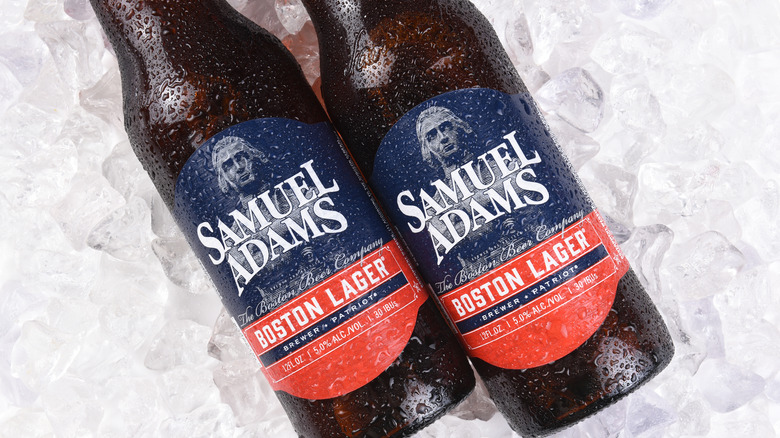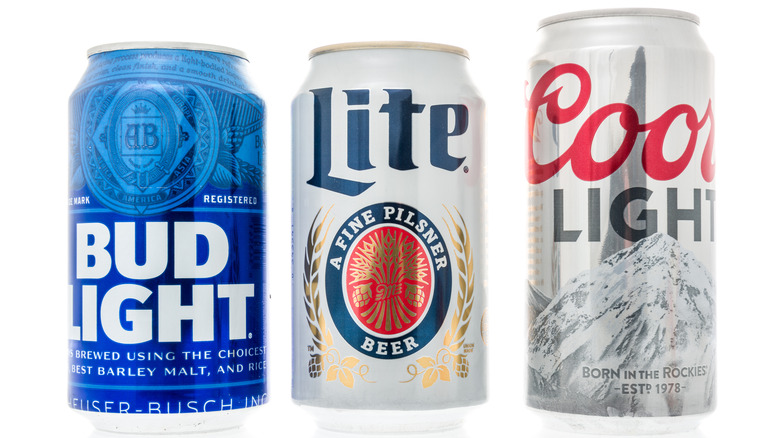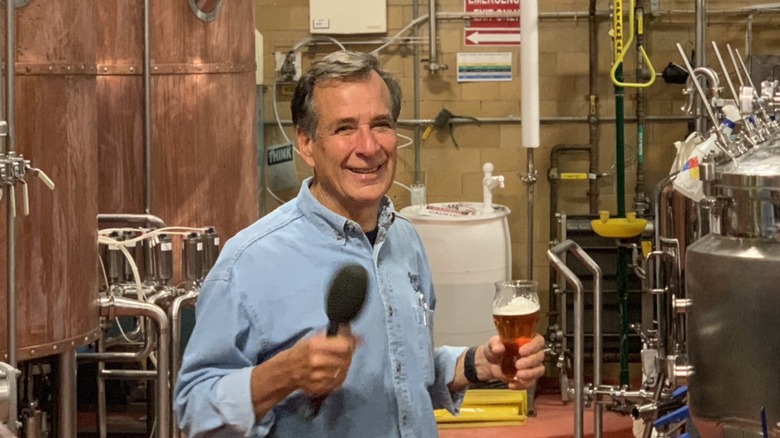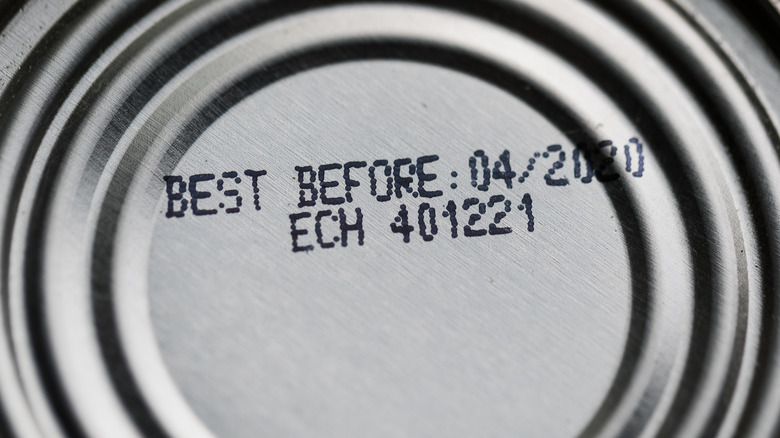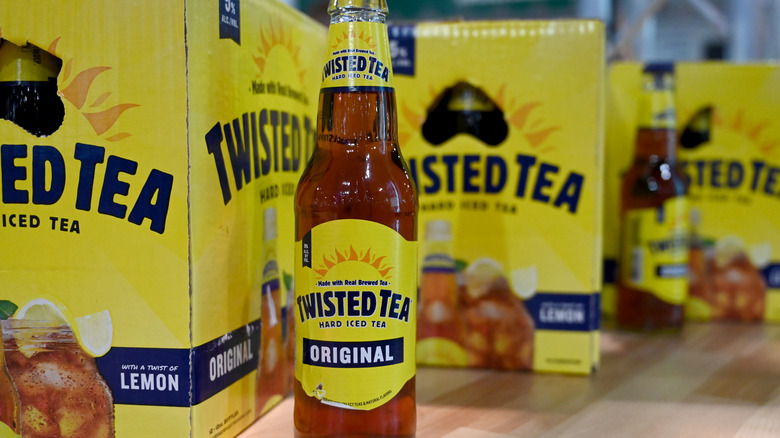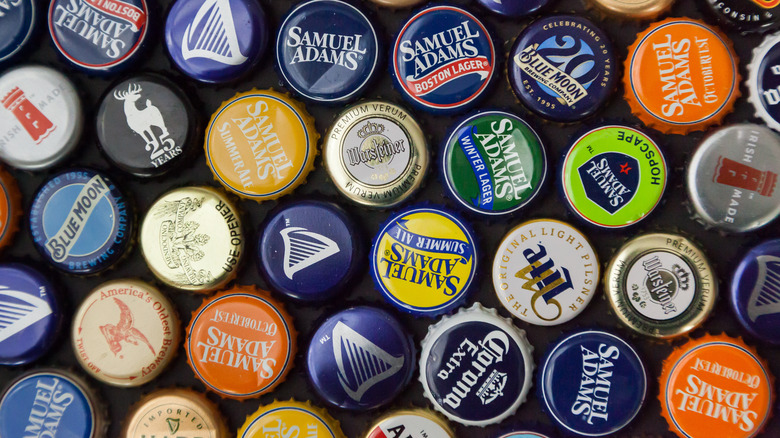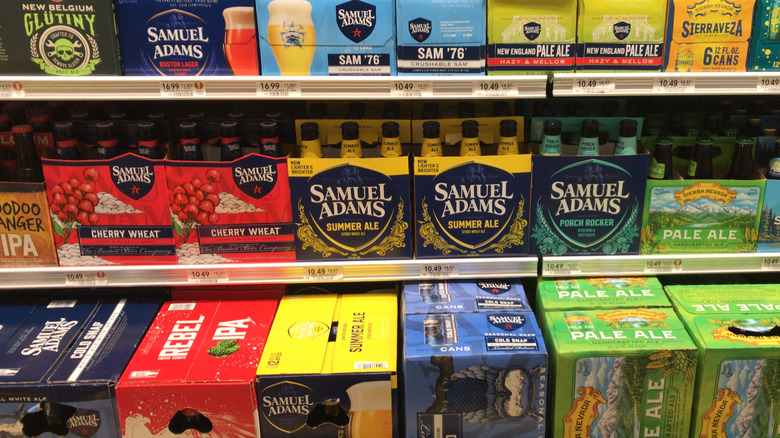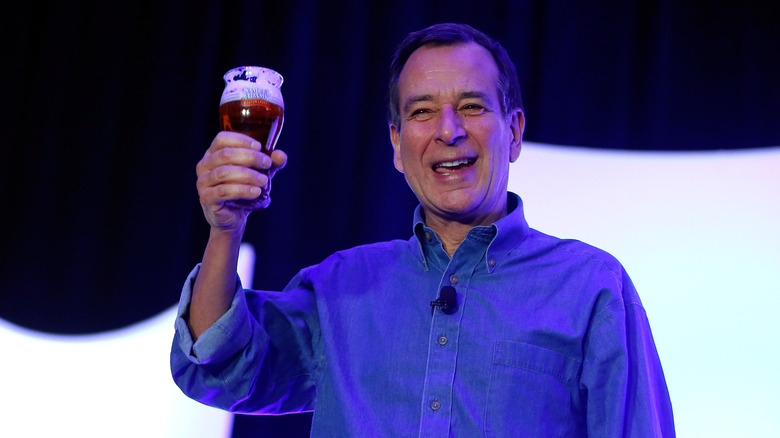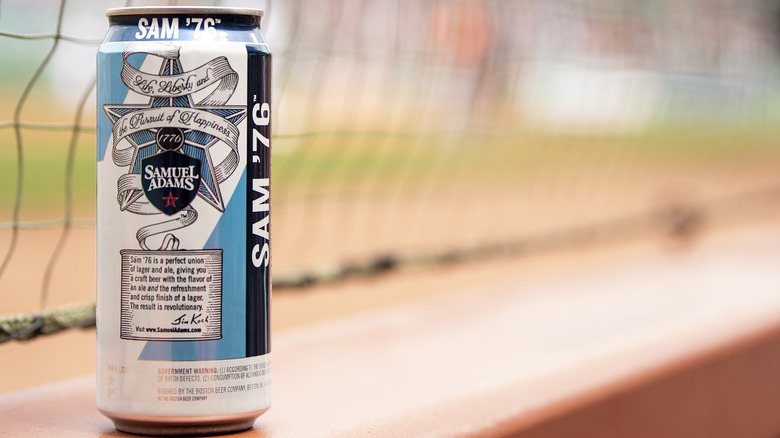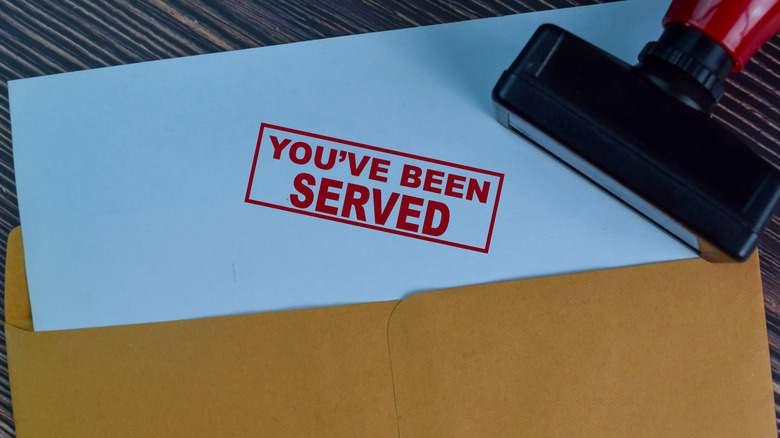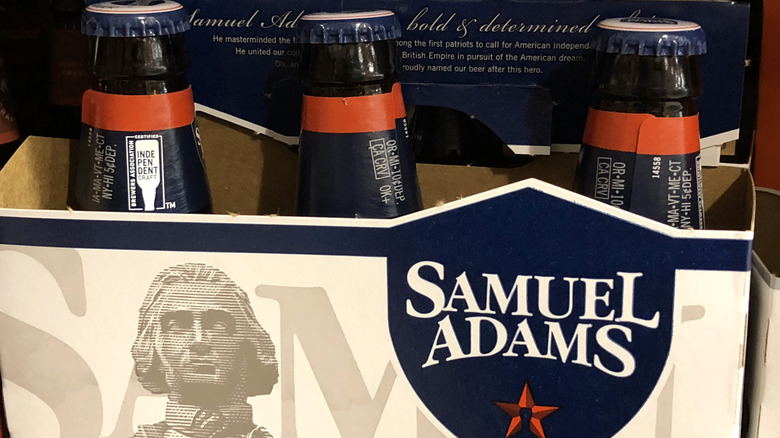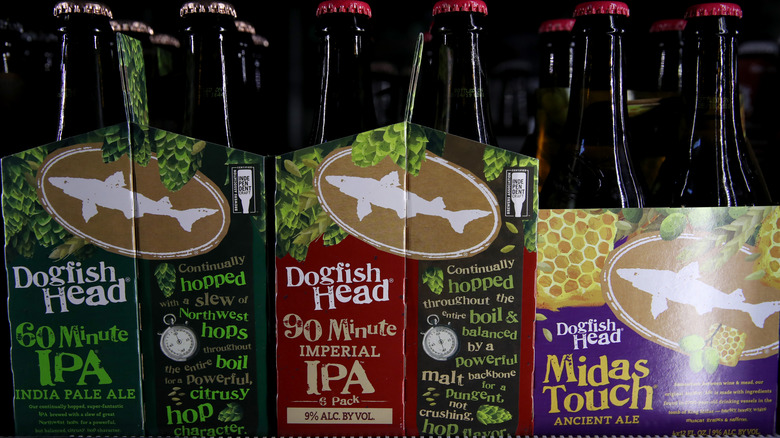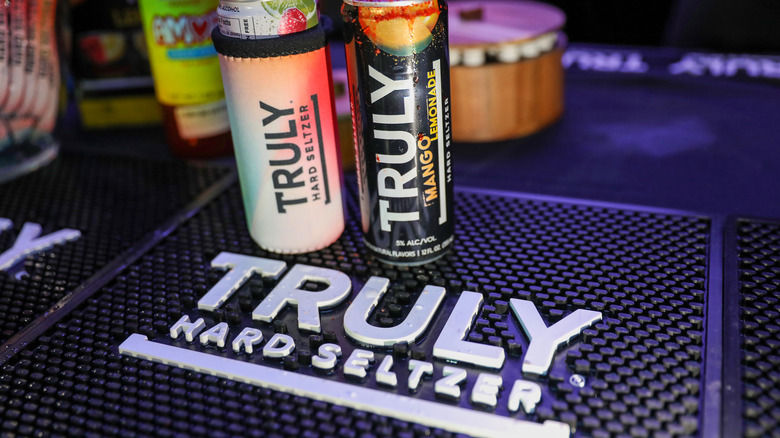The Untold Truth Of Boston Beer Company
The proliferation of craft beers over the past two decades is rather astonishing to consider. It's not just that 9,118 craft breweries were operating in the U.S. as of 2021 (via Brewers Association). It's that the total number in existence has increased more than sixfold since 2006. With such a plethora of delectable beer varieties now at our disposal, it's difficult to imagine what the beer landscape looked like in 1984 — the year Jim Koch first brewed and released Samuel Adams Boston Lager (via Samuel Adams).
Frankly, the impact of Samuel Adams on the world of craft beers and breweries may be immeasurable. The brewery — and its parent company, Boston Beer Company — has been instrumental in elevating beer to the level of sophistication it enjoys today. Having paved a path that's inspired thousands of aspiring brewmasters to try their hand at the art of alcohol production, Boston Beer Company continues chugging along in 2022.
But the craft beer company has much more up its sleeve than just the production of Samuel Adams. In that spirit, grab yourself an ice-cold pint – or, if you prefer, a hard cider or seltzer — as we explore the untold truth of Boston Beer Company.
It began when a family lager recipe was dug out from the attic
The existence of television shows like "Antiques Roadshow" and "Pawn Stars" speaks to a universal commonality. After all, who hasn't dreamed of discovering some unexpected treasure while sifting through old family heirlooms? Of course, while few among us actually finds anything life-changing amid our family's stored items, there are some lucky folks who do. This includes Boston Beer Company founder Jim Koch, who got his great-great-grandfather's lager recipe from his father's attic. The recipe is for the beer that would eventually become Samuel Adams Boston Lager (via Cincinnati Magazine).
Koch didn't exactly come across the recipe by happenstance, though; his father actually gave it to him. Upon learning the eventual Boston Beer Company chairman was committed to following in his family's brewing footsteps, Koch's father led him to the attic. There, he received the family's "best recipe," as he told Cincinnati Magazine in 2011, a beer that had been brewed a century earlier at a St. Louis-based family brewery.
It may have only been a matter of time until the Harvard-educated Koch took the leap into his family's business, with a tradition of brewmasters stretching across five generations and two continents, according to Boston.com. Frankly, considering Boston Beer Company's stature nearly four decades after Samuel Adams' debut, we wonder what took him so long.
It was founded as an alternative to generic, mass-produced beers
The 1980s were a rough time for beer aficionados in the U.S., where generic, run-of-the-mill brands like Coors, Miller, and Budweiser were among the only options available, akin to science fiction for newly minted legal drinkers in 2022. Yet the fact that craft beers dominate the modern landscape isn't some random coincidence. After all, the decade's uninspiring slate of beer options was precisely what prompted Jim Koch to brew Samuel Adams Boston Lager as a higher-quality, better-tasting alternative in 1984 (via Boston Beer Company).
Recognizing brewers in the early '80s were focused on "mass-producing enormous quantities of standardized beer," as Koch told Cincinnati Magazine in 2011, his goal was "to bring Americans a completely different taste in beer." That desire to introduce a different type of beer in the U.S. — one with flavor a person could actually enjoy while getting inebriated — spurred Koch to initially brew Boston Lager.
Anyone who's been lucky enough to grow up in a world where numerous IPAs, hefeweizens, and shandies (to name a few) line every liquor store's cooler owes a debt of gratitude to the Boston Beer Company. After all, Koch wasn't the only craft brewmaster looking to offer an appealing alternative at that time. But as Ray Daniels of the Brewers Association told Boston.com in 2005, "the difference is that Jim not only had the belief, he had the business knowledge to be successful."
Samuel Adams was first brewed by founder Jim Koch in his kitchen
Every successful company has to start somewhere. While some entrepreneurs are fortunate enough to begin their business with every possible advantage, others have to make do with what they've got. Boston Beer Company may have surpassed $2 billion in revenue in 2021 (via Statista), but when Jim Koch first brewed what would become the legendary Samuel Adams Boston Lager, he didn't have a fancy brewery or equipment — he made it in his own kitchen (via Boston Beer Company).
Not unlike Colonel Sanders using his own dining room table to seat guests at the first KFC, Koch wasn't initially concerned about the means of achieving success. The ends of producing a beer far more flavorful and inviting than what was on the market far outweighed any concerns of being perceived as a low-rent outfit. Of course, while most people would likely be too timid to take such a bold risk so close to home, Koch was bolstered by his family's long legacy of beer brewing, which could be traced back to Germany (via Boston.com).
The notion of humble beginnings for massively successful corporations is often romanticized in U.S. culture. Of course, for anyone charting Boston Beer Company's growth from Jim Koch's kitchen to a multibillion-dollar craft-brewing behemoth, it's easy to see why.
Boston Beer Company helped popularize the practice of best-by dates for beer
The controversy surrounding expiration dates (also called use-by dates or best-by dates) is easy to understand. After all, stamped-on dates are a bit of a racket, and they undoubtedly contribute to the immense food waste generated by modern society. Of course, a desire to enjoy a product at its peak freshness is still understandable, especially when it comes to beer. For those who despise skunked beer, the presence of best-by dates on bottles or cans is crucial. Boston Beer Company began including freshness dates, starting with its Samuel Adams bottles in 1988 (via Samuel Adams).
Now, to be perfectly honest, we couldn't find any definitive proof that Samuel Adams was the very first brewery to include best-by dates on the beer it sold to consumers. But Boston Beer Company does seem to have been ahead of the curve with this, and, according to Tampa Bay Times, was indeed one of the initial purveyors of the practice.
There's no denying stamped-on dates can be a double-edged sword for food and drink products. But if it simply provides guidance on the best time to consume a product, such as beer — rather than prodding folks to dispose of still-edible foodstuffs — we can't say we disagree with the practice.
The company produces more than just beer
We all know what happens when one assumes. But if you've always assumed Boston Beer Company only makes beer products, we're inclined to give you a pass (it's in the name, after all). Yet contrary to popular belief, the company also produces several hard-seltzer, cider, and iced-tea brands as well.
Perhaps befitting the second best-selling craft-brewing company in the U.S. in 2021 (via Craft Brewing Business), Boston Beer Company owns some of the most popular non-beer alcoholic-beverage brands on the market. The immensely popular Twisted Tea resides under its corporate umbrella. In addition, the company produces Angry Orchard, which was the No. 1 hard cider brand in the U.S. in 2021 (via Statista), as well as Truly Hard Seltzer, which ranks second in hard-seltzer sales in the U.S. (via VinePair).
We're not entirely shocked to discover Boston Beer Company isn't interested in simply resting on its Samuel Adams laurels. After all, doing the unexpected has driven the company since founder Jim Koch first decided to brew Boston Lager nearly 40 years ago.
Boston Beer Company helped pioneer the craft-brewing trend
The term "craft beer" feels sort of redundant in modern culture. Sure, international juggernauts like Anheuser-Busch and Molson Coors are still pumping out batch after batch of middling product (the type Jim Koch described as the "fast food of beer" to Cincinnati Magazine in 2011). But the fact remains that craft beer has become essentially synonymous with beer in 2022 — an occurrence at least partially attributable to Boston Beer Company and its continual experimentation with the alcoholic beverage over the years.
According to VinePair, the rise of craft beer beyond a personal hobby began in earnest in the late 1980s and early '90s. This tracks with the development of Boston Beer Company, which, as originally established by Jim Koch, sought to reframe the way Americans viewed and consumed beer (via Boston.com).
We're not trying to claim the alcohol company is solely responsible for the state of beer in 2022. But for anyone thankful that craft beer has crossed the threshold to the mainstream, it's impossible to imagine that happening without Boston Beer Company's influence.
Boston Beer Company remains one of the best-selling craft breweries in U.S.
Fair or not, many likely presume craft beer is a label solely reserved for small breweries. But according to Brewers Association, the main criterion for craft-beer designation appears to be a commitment to continual creativity with beer development and brewing. By this standard, it's easy to see how Boston Beer Company may still be categorized as a craft brewery — and why it was the second-best-selling craft brewery in the U.S. in 2021, behind only Yuengling (via Craft Brewing Business).
The massive footprint of Boston Beer Company may cause some to question its status as a craft brewery. After all, the initially modest brewery has grown exponentially throughout its existence. And given the Brewers Association's definition that a craft brewer should produce 6 million barrels of beer or less per year — a benchmark Boston Beer Company managed to surpass in both 2020 and 2021 — the query clearly has some legitimacy.
But regardless of your personal framework for what can or should be labeled a craft brewery, the fact remains that Boston Beer Company is still considered one. How long it remains as such is unclear, but there's little reason to doubt the company will continue to embody the spirit of craft breweries either way.
Its founder taste-tests every batch of Samuel Adams Boston Lager
There's nothing remarkable about business owners taking a hands-on approach to their company. Frankly, if it's your reputation and financial livelihood on the line, it's downright expected you'll have your fingers in every area of operation. Of course, the bigger a business grows, the less time an owner has to conduct basic tasks. Not that Boston Beer Company's corporate growth has stopped founder Jim Koch — who, according to Samuel Adams, still personally tastes every single batch of Boston Lager the brewery produces as of 2022.
Noting his belief that no two Boston Lager batches "taste the same," Koch told VinePair in 2018 that he still tries "a bottle of every batch that we make." Some may question how a man juggling so many responsibilities can find time for such a menial task, but as someone who describes Boston Lager as his favorite beer, Koch clearly doesn't find this part of his job work at all but rather as a "reward."
Sometimes, the obvious answer is the best one. And when it comes to Koch's commitment to still taste-test every batch of Samuel Adams Boston Lager himself, it's clear he simply can't get enough of his company's signature product.
The Sam Can was created to help reduce consumers' bias against canned beer
It's a fairly common belief that beer from a bottle is superior to that from a can. Of course, while we, too, have held a prior preference for glass over aluminum when it comes to beer, it's hard to deny a shift over the past decade has caused many to reevaluate that position. And, as is the company's M.O., Boston Beer Company didn't wait for the trend to find it. In fact, the company took initiative by introducing the Sam Can in 2013, offering a convenient canned Samuel Adams beer that is just as good as the bottled version.
Did the company's Sam Can play any hand in the cultural reevaluation of canned beer in relation to bottles? It's hard to say. In addition, since a 2016 study (published in the academic journal Beverages) illustrated the preference for glass over aluminum isn't backed by any sort of scientific evidence, the Sam Can may not have been worth the "million-dollar investment" that Jim Koch told Forbes in 2017 that his company made in equipment and research.
If nothing else, a noticeable boost in the prevalence of canned craft beers was apparent by 2014, according to NPR. The Sam Can may or may not have helped prompt this increase, but at least consumers' changing preferences meant the can's extravagant price tag wasn't an entirely sunken cost.
It once sued a former employee to protect the company's trade secrets
The use of non-compete clauses and non-disclosure agreements (via PBS) can get a bit tricky, legally speaking, depending on the context of the signed agreement. Those used to protect a company's inside information from outside sources and external competitors are less problematic, but that doesn't mean legal issues won't still arise. This was the case in 2011 with Boston Beer Company, when it sued a former executive, Judd Hausner, along with his new employer, Anchor Brewing, for violating a non-compete clause with the company (via Boston Business Journal).
On the surface, Hausner's decision to join Anchor Brewing — a rival of Boston Beer Company located in California — could be construed as a violation of any signed agreement. But with the California Supreme Court ruling non-compete clauses were illegal in the state in 1998, the case was far from clear cut.
Like many legal areas in the U.S., it's uncertain whether either party was completely in the right or wrong. No matter who you sided with, though, Hausner and Boston Beer Company were able to come to an agreement within a few months. While no details were released, the case was dismissed in December 2011, with both parties agreeing to a settlement (via Law360).
Samuel Adams' bottles were recalled in 2008 due to glass shards inside
As the old saying goes, pobody's nerfect. Of course, while accidentally (or intentionally) switching the first letter on a pair of words is almost aggressively benign, not all errors can be chalked up as victimless — for example, discovering glass inside a beer bottle. Unfortunately, this was the case for Boston Beer Company in 2008, when it was forced to recall several batches of Samuel Adams beer bottles that contained small shards of glass (via Boston Herald).
It's fair to say the glass incident was a deadly serious affair, though entirely condemning the craft-brewing giant may be a bit harsh given its swift response to what it said were defective bottles from a glass company (via Boston Herald). Boston Beer Company didn't sit idly by, and, by all accounts, no one appeared to have been injured in any capacity. In addition, the company noted it was "disappointed and disturbed by this development," according to a statement released by founder Jim Koch (via Boston.com), who also declared the company "didn't live up to our drinkers' expectations" with the incident.
When someone makes a mistake, we're usually quick to forgive. Though giving Boston Beer Company a total pass for its 2008 recall may be too lenient, it seems safe to say the company satisfactorily rectified the situation — while learning from the mistake in the process.
It announced a $300-million dollar merger with Dogfish Head in 2019
A business attempting to grow and expand over time in hopes of increasing its overall profits and market share is eminently understandable in a capitalist society. In that vein, the predilection for independently successful competitors to merge is fairly reasonable as well. After all, why fight against an entity when you can instead work with them? Perhaps, then, the 2019 merger between Boston Beer Company and Dogfish Head — two of the 15 largest craft breweries in the U.S. at the time — is less shocking than it was inevitable (via Brewbound).
The decision to merge appeared driven by a mutual goal: ensuring each company remained independent and American-owned in the future (via Dogfish Head). In addition, by joining forces, the two companies would create "the most dynamic and diverse American-owned platform for craft beer and beyond," Jim Koch said in a statement at the time.
It isn't immediately clear just how effective the merger between the two craft breweries has been. But if nothing else, it seems to have helped Dogfish Head make it through the COVID-19 pandemic unscathed, as it released its first non-alcoholic beer in 2021 (via Forbes).
The hard-seltzer trend led to a massive sales increase in 2020
Sales of hard-seltzer beverages have skyrocketed since the mid-2010s, with the market generating more than $14 billion in revenue in 2022. With hard seltzers being a carbonated, less-filling alternative to beer, it's no mystery why they have made a monumental rise over the past half-decade. And Boston Beer Company has been no stranger to this trend, with its Truly Hard Seltzer brand helping to lead the way in the company's astonishing 38% sales increase in 2020 (via Brewbound).
Of course, it's impossible to discuss a boost in hard-seltzer sales during 2020 without acknowledging the hand played by the COVID-19 pandemic. After all, social distancing and stay-at-home guidelines of the period (often buoyed by fear and uncertainty) affected countless individuals' drinking habits — leading many to drink more while isolated at home (via Massachusetts General Hospital).
Though the dog days of COVID-19 are (hopefully) behind us, it's unclear when the hard-seltzer phenomenon will apex. Some wonder whether the trend is over already, but the popularity of hard seltzers remains fairly high in 2022. Frankly, if Boston Beer Company has anything to say about it, hard seltzers are here to stay.
